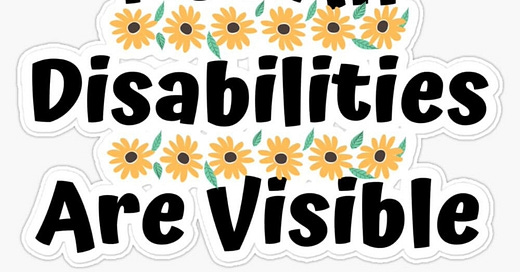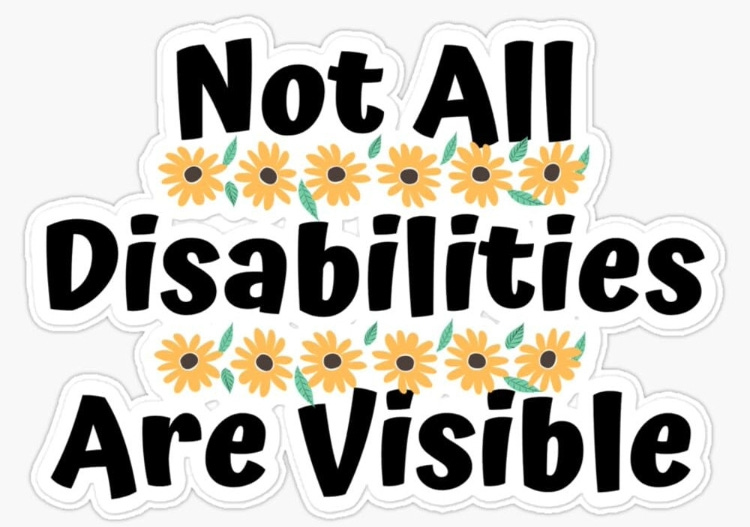Hiding in Plain Sight: Unmasking the Reality of Invisible Disabilities
I look at the woman, two people in front of me, ready to board the plane. She’s wearing a cast on her foot to her shin. I’m frustrated, say something, and she looks at me surprised. No one could tell that she was a pretender. The cast is slightly tilted the wrong way and is half an inch short on her foot.
Pretenders make things more difficult regarding accessibility, like being in front of a line or at an event; they take up needed space from those who need it. Worse, they’re tricky to spot, and since all my disabilities are invisible, I’ve been accused of pretending, ironically, sometimes by pretenders. All my disabilities are invisible unless I break something and am in a cast, but like the woman, I could be pretending.
I didn’t accept being disabled for a long time. In the environment (including schools), they seemed to be viewed as lesser than, or people were only that word. I didn’t want to be one word, or if I was, I wanted it to be cool, such as “hellraiser,” “militant,” even “defiant” or “trouble” would do. Just like gay or gender-conforming (nonbinary), those were pieces of my identity, and I wouldn’t want to be only one of those words either (though gay often stuck). Since all my disabilities were invisible, I could pretend, only in a different way.
I went into hiding. My hearing was only bad then. While I probably should have had hearing aids, I didn’t. My heart was my heart. All its problems (six, yo; seven if you count a one-time but months-long thing) were invisible, and I was active as hell. I may not have been popular from fourth to eighth grade, but I did things like pick up litter or just walk, which I love to do. Sometimes, I ran. Sometimes, someone would pick a fight, and I’d finish it, which meant my brittle bones were invisible. Yes, I was in casts frequently, but I let people think I was a daredevil and I was a beast on crutches. I was nicknamed “the wind,” and when teachers asked about me, others would comment that if they saw a blur, it was me.
I was hardcore and earned the name “militant” by some cliques. I was loud. I was an organizer, always with a cause. As a kid, I organized others picking up litter with me; at sixteen, I organized a march protesting proposed state legislation, and of course, I participated in every march or event. In college, two guys three times my size threatened me physically, touched me hard (that sounds gross, but I didn’t know if what happened warranted the word “assault,” so there you go), and got in an elevator (we were waiting for one) and when it arrived, I got in the elevator; I was waiting first. Some called this stupid, but I followed them to get their names and report them. That’s how I roll.
I organized several events in college down to the smallest detail (security, permits, performer contracts, promotion, confirmed headcount, and the fun stuff). I was the president or vice president of several student organizations, the head of campus education for relationship violence prevention, and a Resident Advisor. Of course, I organized things from concerts, salsa dancing, educational presentations, making a diversity video for student housing, fundraisers, student community volunteering, and bringing in national speakers. I was the brain, enrolled in senior classes as a freshman, and always tested in the 99th percentile. I received diversity, community service, educational and academic scholarships.
I’m not bragging, but people with invisible disabilities – someone can do this? They don’t need assistive devices? They can push it physically; they’re intelligent; they can plan and organize things – no short attention spans? They can be “normal?” I hate that word, but yes, we can. The word “invisible” means we can hide in plain sight. We’re in control of people knowing. (I mentioned everything above because I also have traumatic brain injuries – yes, plural, and neurological conditions, and people have these specific hangups; I wanted to address them.)
I was very happy I could hide, and I did to the point of people thinking I was flaky or noncommittal at times when the truth was a lung had collapsed, or I had/was having open-heart surgery, that sort of thing. Yes, my self-stigma was that strong. The downside was that sometimes I didn’t get what I needed because hiding meant I couldn’t ask for it. It wouldn’t be appropriate.
When I was in the process of “coming out,” I realized my stigma wasn’t the only stigma out there when it comes to the “invisible.” Many people look at us and think we’re faking it, like that “pretender” two people in front of me. Often, unless I’m 100% certain, I don’t say anything, even if I’m 99% sure a person is faking it. Like the homeless, I can spot phonies sometimes. There are tells they give away. Tiny details they don’t think about or know because you need to be a part of that group to identify one another. (Yes, I’ve been homeless for spells. It’s one of the reasons it bugs me when people say negative things about the homeless.)
How do you get what you need without wearing a sign? Believe us. Believe people who ask, even if they may be pretending, because I promise there are fewer pretenders than there are people with invisible disabilities. Image descriptions, assisted-hearing devices or closed captions, and rows for people with disabilities to take. Parking spots, duh. There often aren’t enough spots. I already went on about accessibility and providing accommodations, so I won’t get into them. Instead, I’m stressing that just because someone appears not to have a disability, accommodate them.
As someone with a long list of disabilities, that’s what I do unless it’s painfully obvious, even if it isn’t obvious to others, such as a misplaced cast, tiny details that only people with invisible disabilities notice. Otherwise, I assume they’re like me. Someone who appears “normal” (God, I hate that word!), if they ask, I accommodate them if it’s on me (image descriptions, subtitles to anything recorded), and so should others.
Many of us are invisible. You won’t recognize us, even if you try. If you see someone take a parking spot or, if like me, someone requests something for the deaf, such as closed captioning, but they speak perfectly (and how can a deaf person do this if they’ve never heard speech? It’s because I became deaf as an adult, not as a child or young adult), or many other accommodations. We ask for what we need, not what we want. We don’t ask for more. Accommodate, be accessible, or you’ll face someone like me, and not in a pretty way. (That is not a threat; it’s a deadpan fact.) To all my fellow invisibles, always get what you need, even if it requires a little (or a lot of) pushback. To those who remain in the shadows, it’s so much better outside, but I respect where you’re at. To all the pretenders, stop because it hurts the invisible, and if I recognize you 100%, you will be embarrassed by a solid call-out.
Here's to accessibility for all, including us “invisibles.”




